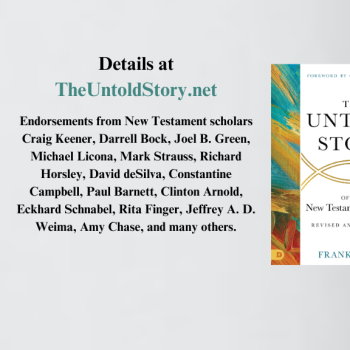Bell's recognition and celebrity hit a new high with the publication of Love Wins—a 2011 New York Times bestseller. The book and the controversy skyrocketed Bell into the national media. In Love Wins, Bell invoked the well-known interpretation of the kingdom of God, which holds that heaven and hell may not be somewhere else—but that, rather, they are right here among us. For Bell, the "new creation" in Christ is already working within creation to transform it through the death and resurrection of Jesus Christ.
This is hardly a new idea, but Bell's placement and his reminder within the evangelical community, created a firestorm even as it drew the interest not only of many young evangelicals, but also of readers across the religious and ideological spectrum.
Nonetheless, the voices of young Calvinist evangelical leaders condemned Love Wins with a comprehensive and ferocious attack. Pastor and author Kevin DeYoung called Bell's Christology "classic liberalism," his use of scripture "mistaken" and a form of "biblicism," his history "misleading," and his eschatology "muddled," finally concluding that Bell is a "universalist" who worships "a different god . . . [a] small god so bound by notions of radical free will that I wonder how Bell can be so confident God's love will melt the hardest heart."
The fierce nature of these attacks is balanced by the passionate tone of positive responses to Bell. For many he is a celebrity and a rock star. In one short YouTube video, a random Mars Hill attendee says she wants to meet Rob Bell, and her friend responds, "Let's go now." The college student and friend go, meeting Bell on the stage at Mars Hill where the three of them talk. Afterward Bell gives each of them an awkward but gentle hug around the shoulders, his face maintaining a calm and pastoral look. When the video shifts to their return from meeting Bell, the girl exclaims, "Why am I acting like this is a celebrity?" But she isn't alone in viewing Bell as a celebrity. A friend of Bell's told me that he was recently walking with Bell in New York City when a group of young women ran up to Bell to ask for autographs.
I had an even more personal experience with this phenomenon during the course of my research. My fifteen-year-old daughter got to know Rob Bell through the Nooma films. Soon after I started this project, the complete set of Nooma DVDs came in the mail, and my daughter suggested we do a father/daughter night and start watching them together. She bubbled, "I like him better in brown hair" (referring to his blond stage in the earliest films). In the later films, when Bell is pictured with a crew cut, she exclaimed, "I like him better with long hair!" After we watched the fourth film, she murmured, "I love Rob Bell," then moving past the hair comments, she added, "I feel like he understands where I'm coming from; I want to be like him."
This kind of adoration is exhibited not only by young people, but also by a legion of older followers who see him as a gifted communicator of a message that moved them. One online reviewer described Bell's Drop Like the Stars Tour Film on Amazon: "The idea that a person could essentially preach a two hour sermon, hold the attention of those participating the entire time, make people laugh, make people cry, have them do something during the interaction that not only heals those who are present, but also does some good for a group of people in need, and then records it so that other people can witness what happened during a two hour gathering is ludicrous. And yet, Bell doesn't even look like he's trying. He pulls it off with the same grace and humility we have come to expect from him."
A thirty-year-old volunteer at Mars Hill who had tried out a different churches explained her experience to me like this: "I was looking for a form of Christianity that is real, gritty, and matches the experience of my life—and I found what I was looking for here. We talk about the issues that we all face here and how faith makes a difference; it's real, it's powerful and it gives me hope for the church."
These powerful reactions to Bell don't come only from his own "tribe" of evangelicals. A progressive Episcopalian priest who has one of the fastest-growing churches in his diocese explained, "I was searching for some good, honest, progressive media to use with adolescents as we tried to forge a spirituality of sexuality. I found one of his short films—from his Nooma series—where he talks about sex, the Bible, his own passions, and then pours gasoline on a pile of old timber the size of a house and strikes a match. I came to see that Rob had a pastor's heart of compassion, and an incisive mind that seemed hungry to search beyond the first answer to the questions he was asking. Still, here's the best part: the kids in my high school youth group, when they saw that first Bell film, they 'got it.' "
The love, devotion, and controversy that Rob Bell evokes shows from the sales of his books and films, and also from the popularity of his sermon podcasts (with 40,000 to 55,000 downloads per week while at Mars Hill). Bell strikes a chord.




